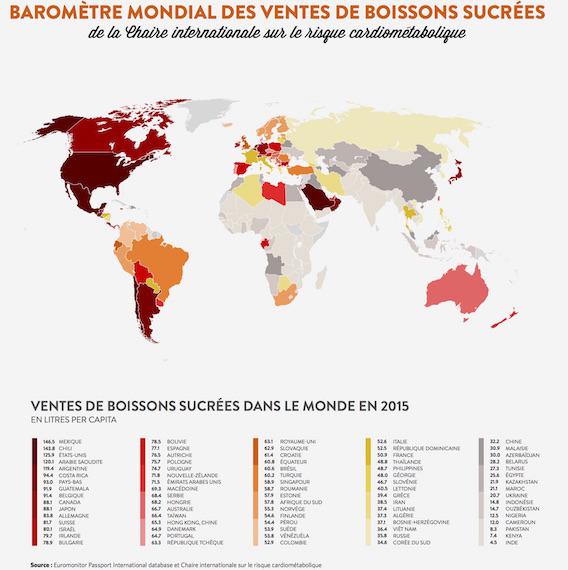Sales of sugary drinks are declining globally globally but remain high in many countries. Energy drinks are becoming more and more popular.

On the sidelines of the annual congress of the European Atherosclerosis Society, the International Chair on Cardio-metabolic Risk (ICCR) unveils the global barometer of sales of sugary drinks, and its conclusions are worrying. Although they have declined overall, global sales of sugary drinks remain high in developed countries. The energy drink market is booming.
Increased sales of energy drinks
To achieve this barometer, the authors analyzed sales of soft drinks, sweetened fruit juices, energy drinks, and sports drinks around the world. The results indicate, without surprise, whathe Chile, Mexico and the United States lead the world sales. Mexicans consume 146.5 liters of sugary drinks per year per capita. Globally, the highest increases are observed in Vietnam, Georgia and Saudi Arabia.
In Europe, the trend is downward, except in Belgium, Denmark and Luxembourg. Our German, Belgian and Dutch neighbors are the biggest consumers of sugary drinks with average annual volumes per capita of 93 to 83 liters. The French seem in comparison very reasonable: they buy “only” 51 liters of sugary drinks, a figure in decrease, 2.7 liters per year and per inhabitant.
In parallel with this drop in sales of sugary drinks, a marked increase in energy drinks has been observed, both in emerging and developed countries. In France, sales have increased by 44% in five years. This trend concerns all other European countries except Ireland, Portugal and Finland.
600 million obese in the world
According to the WHO, the number of cases of obesity in the world has doubled since 1980. In a world where there are nearly 600 million obese, overweight and obesity affect nearly 42 million children less than five years old. In France, 14.5% of the adult population is obese. WHO estimates that by 2030 the number of overweight people is expected to reach three billion people. The reason: the increased consumption of high-calorie foods and the lack of physical activity. The sedentary transition of many forms of work, the evolution of lifestyles and urbanization favor the appearance of overweight, even obesity, details the WHO.

Health consequences
In addition, diseases linked to obesity are significant. Cardiovascular risks, musculoskeletal disorders – osteoarthritis, liver, colon or breast cancer, the health risks are multiple. “The science is clear: the overconsumption of sugary drinks is associated with several health problems,” underlines Benoit Arsenault, assistant professor at the Faculty of Medicine at Laval University. The marked increase in sales of sugary drinks in developing countries is worrying and should be on the radar screen of public health authorities. “.
“Europe must remain vigilant. EU countries are still among the largest consumers of sugary drinks in the world. The increase in sales of energy drinks is particularly alarming; they are no less harmful to health and, combined with the increase in sales of sugary drinks, contribute to the global obesity epidemic ”, deplores Jean-Claude Coubard, President of the European Alliance for a Healthy Lifestyle .
.

















